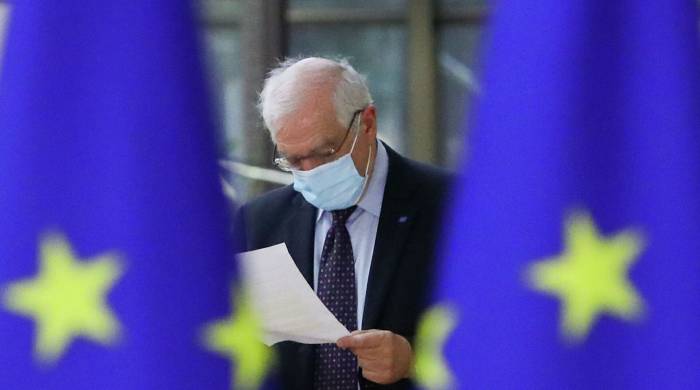EU finalizes the preparation of new sanctions, Minsk goes on counteroffensive
 The situation has not changed
The situation has not changed

While the EU is finalizing a new package of sanctions in response to the migration crisis, the Belarusian regime is actively promoting its “foreign trade miracle”, facilitated by the postponement of the fourth package of EU sanctions, the recovery of the world economy, and upward trending commodities prices for potash fertilizers and petrochemicals. However, the increasing toxicity of the Belarusian regime has already led to debt refinancing problems and stalled investment projects. However, Minsk remains optimistic and is trying to challenge EU sanctions in the European Court of Justice.
Following the European Council summit on October 21-22nd, the EU will continue to resist the hybrid attack by the Belarusian regime by introducing additional restrictive measures against individuals and companies, and working with third countries to limit state-supported human trafficking. For the moment, the EU has not yet decided whether to extend previously announced measures against Belavia to the leasing transactions of the Belarusian aviation committee.
Following the EU and NATO, Polish President Andrzej Duda accused Alexander Lukashenka of organizing a hybrid attack on neighbouring countries, while German Foreign Minister Heiko Maas called Lukashenka the organizer of migrant flows on the border of Belarus and the European Union. Berlin advocates strengthening sanctions in response to the growth of migration flows to the EU through Belarus, and suspending the bank accounts of companies involved in organizing migration.
Meanwhile, the Belarusian side is mounting a counteroffensive in the courts. MAZ, BelAZ and Belaeronavigatsia are challenging EU sanctions in the European Court of Justice (ECJ), arguing that the decisions of the European Council on the introduction of restrictions are unlawful and that they should be overturned and the plaintiffs legal costs reimbursed. Russian oligarch, Mikhail Gutseriev, known to be close to the Belarusian regime, has also appealed to the ECJ to overturn sanctions.
Meanwhile, volatile global potash prices play into the hands of the Belarusian authorities, prompting Belgium and a number of other EU countries to lobby for relaxation of restrictions imposed on the Belarusian potash industry.
Minsk is also buoyed by the postponement of the fourth package of EU sanctions until 2022, rising global demand, and energy crisis arising from high oil and gas prices. Between January-August, the supply of Belarusian exports amounted to more than USD24.5 billion, an increase of 36.4% compared to the same eight months in 2020. “Classified exports” (sanctioned mineral, chemical, and engineering products) accounted for 57.4% of Belarus’ foreign trade, or USD14.08 billion In January-September, Belarus also increased petroleum exports to Ukraine by 28%, increasing from 2.51 million tons in 2020 to 3.22 million tons. Bitumen supplies alone amounted to 443.8 thousand tons, representing a 14% increase.
On the other hand, the toxicity of the Belarusian regime is interfering with some investment projects, and increasing the costs and difficulty of refinancing external debt.. The imminent introduction of the fifth package of EU sanctions in November will amplify the concerns of international partners and lead to the curtailment of the Belarusian foreign trade miracle, exacerbating tensions between the Belarusian regime and Western capitals.
Subscribe to our newsletter




Situation in Belarus
Constitutional referendum: main consequences


 Video
Video
How to count the political prisoners: are the new criteria needed?


 Video
Video
Paternalism In Decline, Belarusian Euroscepticism, And The Influence Of Russia


 Video
Video












